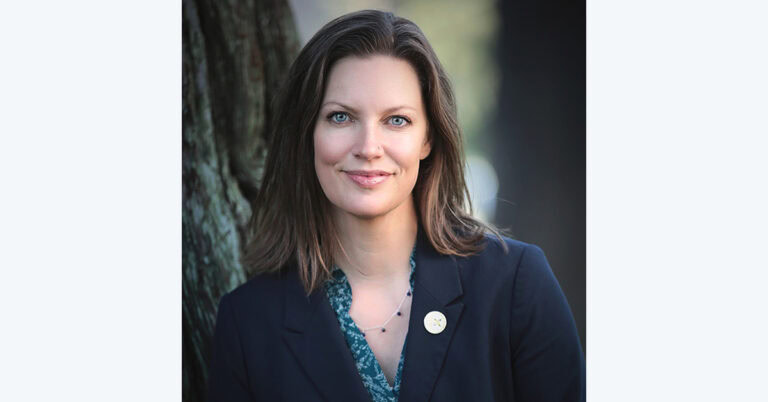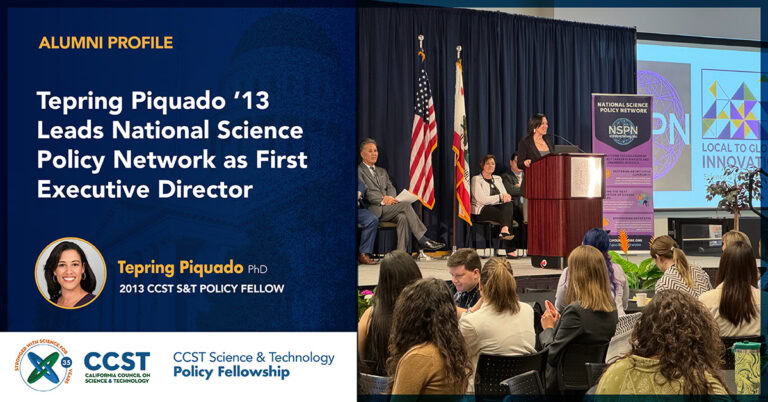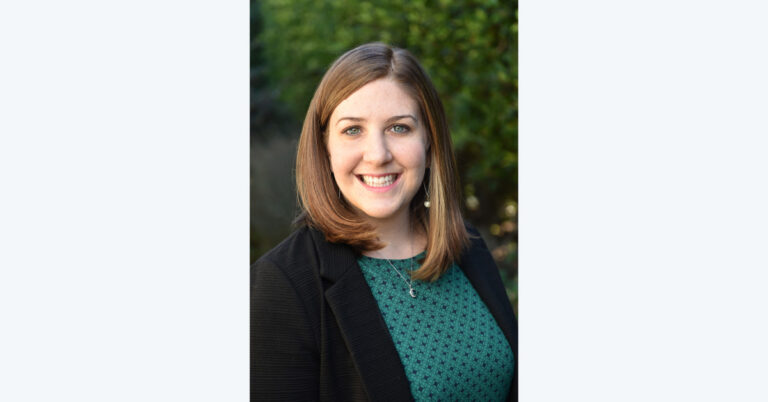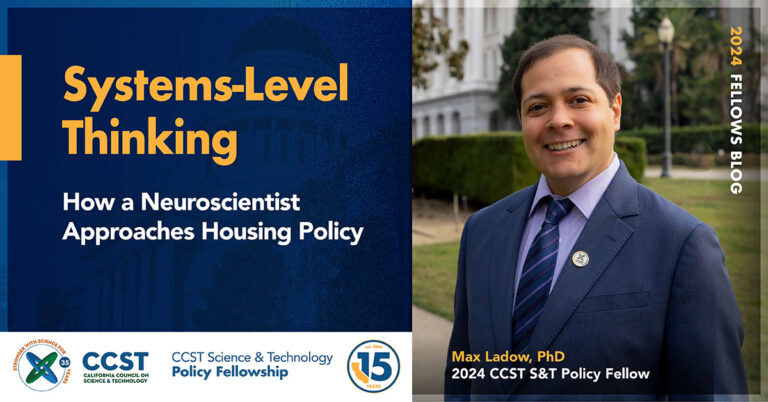CCST’s Brie Lindsey, PhD, Hired as Deputy Director at California Ocean Science Trust
How Extracurriculars Shaped my Policy Career – ’23 Fellow Stephanie Mitchell, PhD
October 30, 2023 | CCST Newsroom, CCST S&T Policy Fellows
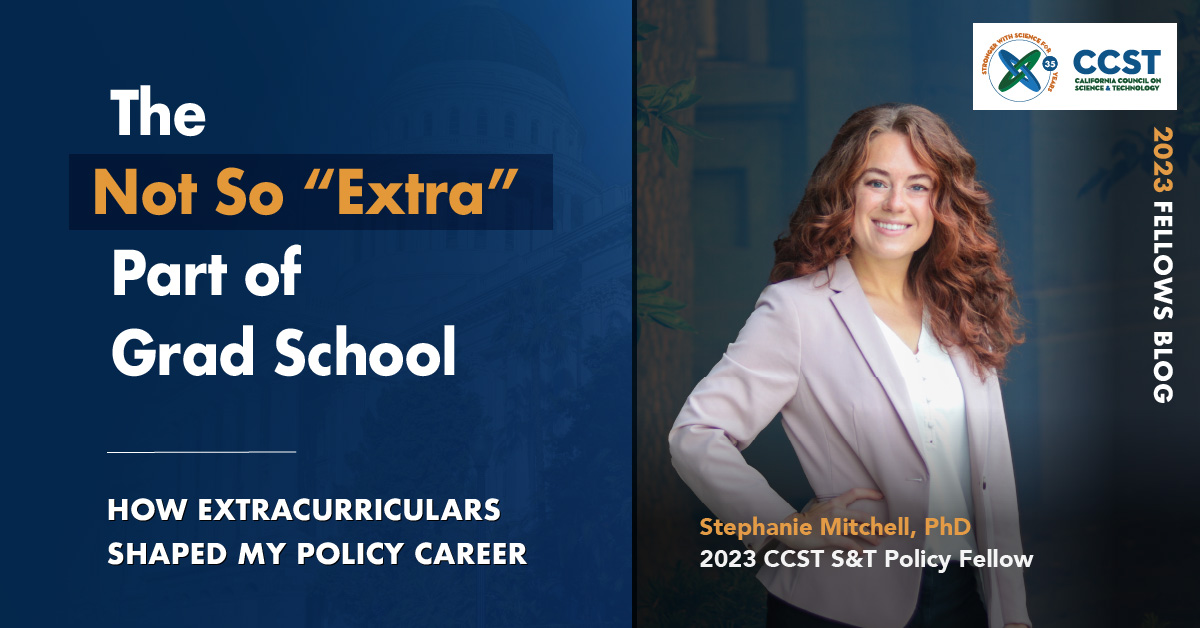
There are many ways that being a scientist can help prepare someone to work in a policy role, and I’ve come to see that my work both inside and outside of the lab helped set me up for success.
Subject matter experts play an important role in state agencies and legislative policy committees. Having scientific training brings an additional skillset to policy work: conducting research, evaluating ideas, managing time across multiple projects, writing up research findings, and a slew of other valuable skills.
Most of these professional skills take on a new form in the policy arena: instead of combing academic journals you’re more likely to get information from individuals and curated reports; instead of being asked to generate data, policy is solutions-oriented decision making. Even skills like writing research papers (basically a very long persuasive article with figures to convince the reader, and reviewer #2, that your conclusions are accurate) are super helpful in thinking how to present the most logical argument to your reader.
Learn More: Check out other blogs on working in a Senator’s office, working on a legislative policy committee, working at a State Agency, and building a sense of community to learn about the experience of other fellows!
I found that the non-traditional parts of graduate school and the extracurricular activities I participated in, were also fundamental for helping me start leveraging my experiences and scientific expertise into something that would be even more valuable in a policy committee.
I’ve grouped my experiences into four recommendations below, though there are many experiences that would support any number of skills!

#1 Practice written and verbal communication
Practicing written and verbal communication skills is my #1 recommendation for scientists entering a policy field. Most graduate students are familiar with preparing slides for group meeting, updating their advisor on project progress, and preparing manuscripts. These skills are of course beneficial for policy work—where a significant part of the job is researching bills, analyzing their impact, and suggesting amendments to improve them. The bill analyses reflect all this work and are publicly available, so they need to be understood and helpful to people who do not necessarily have expertise in the subject matter of the bill.
Practicing written and verbal communication skills is my #1 recommendation for scientists entering a policy field.
To grow these skills, I’d encourage anyone interested in policy to think about how they communicate with non-specialized audiences. The time I spent engaging in scientific education and outreach in graduate school has been very valuable in thinking about how to distill complicated information into brief, compelling pitches. Writing science blog posts helped me hone these skills because it gave me the opportunity to think about engaging a reader, presenting ideas in the most helpful order, and reducing jargon for a more general audience.

As someone in a policy consultant role, I am also responsible for briefing decision makers and staff about the bills and answering any questions they have. This requires condensing an entire analysis into just a few minutes verbal explanation (no slides). In graduate school, I pursued opportunities to do community outreach and volunteer at the library to help adults studying for their GED.
Opportunities like these gave me time to start getting comfortable talking to people I’d never met before, teaching with respect (the students were often much older than me), communicating across different backgrounds, and practicing creating and sharing concise messages. Spending time doing any kind of outreach or advocacy is great practice in confronting cognitive biases, finding how to reframe issues, and getting comfortable meeting new people, which would all be helpful skills for someone wanting to enter the policy world.
#2 Develop leadership and adaptability
A unique aspect of working in policy is being involved in negotiations. Negotiations are rarely comfortable, but getting practice hearing many voices, responding quickly to changing circumstances, making hard decisions, being politely persuasive, and learning how to cope when frustrated are helpful. Graduate students can learn these skills by leading different aspects of lab work (e.g. safety training, professional development),developing research collaborations, or participating in student government.
Spending time doing any kind of outreach or advocacy is great practice in confronting cognitive biases, finding how to reframe issues, and getting comfortable meeting new people …
For me, I grew as a leader and became more adaptable by organizing conferences and leading outreach initiatives for the lab. These gave me the opportunity to take risks, get feedback, and adjust my plans. Scientists tend to be a resilient group because we constantly need to solve problems, recover, and get back into lab after a series of bad results.
Graduate school is also a great time to pay attention to your coping methods so you can use those in a new line of work as well. For me, cooking with friends, reading, hiking, and going for a bike ride all helped me de-stress when things got tough—all things I still do now!

#3 Seek out interdisciplinary teamwork and collaboration
Not everyone gets the opportunity to conduct interdisciplinary research and collaborate as an inherent part of their graduate career. Traditionally, throughout the course of a PhD, researchers work with the people in their own lab—a group of people who all share similar research experience and use similar conventions/lingo when discussing that work.
I had a unique experience of being able to conduct research with numerous labs across many disciplines. This diversity of scientific expertise helped give me great perspective on how my research fits into a ‘bigger picture.’ Discussions with collaborators outside of my field helped pushed me out of my traditional frameworks and helped me learn how to communicate professionally with folks who have frameworks of their own.
Attending conferences with a broad scientific reach and seminars a bit outside your field is another great way for researchers to practice these skills! Conferences and seminars are helpful to practice thinking critically on information that gets presented verbally. In the legislature, it is common to take meetings where information is only given verbally and negotiations happen in real time.

#4 Ponder a post-grad policy career
Finally, take time to ponder policy. There are many career opportunities in science policy today, including the CCST S&T Policy Fellowship. As I mentioned before, getting involved in some kind of student government is a great way to learn about the challenges of policy work in real life. For me, I learned a lot from groups like the National Science Policy Network, the American Association for the Advancement of Science, and the Arizona State University’s Center for Engagement and Training in Science and Society. Even intentionally staying up to date on the news on can be great way to learn about the complexities of policy!

Generally, my best advice for preparing to make the shift from science to policy is to pursue the things you’re passionate about in graduate school, because in that process you will inherently build a resume for getting a job that you’ll be passionate about in policy. Go out and try new things!
About the CCST Science & Technology Policy Fellowship
The CCST Science & Technology Policy Fellows program places PhD-level scientists, engineers, and social scientists in the California State Legislature, State Agencies, and Offices of the Governor for a year of public policy, leadership training, and public service—training scientific thinkers to be policy-savvy, while helping equip California’s decision makers with science-savvy staff. Discover how our CCST S&T Policy Fellows make a difference in California’s policy arena and learn how to apply at CCST.us/CCST-Science-Fellows-Program.

